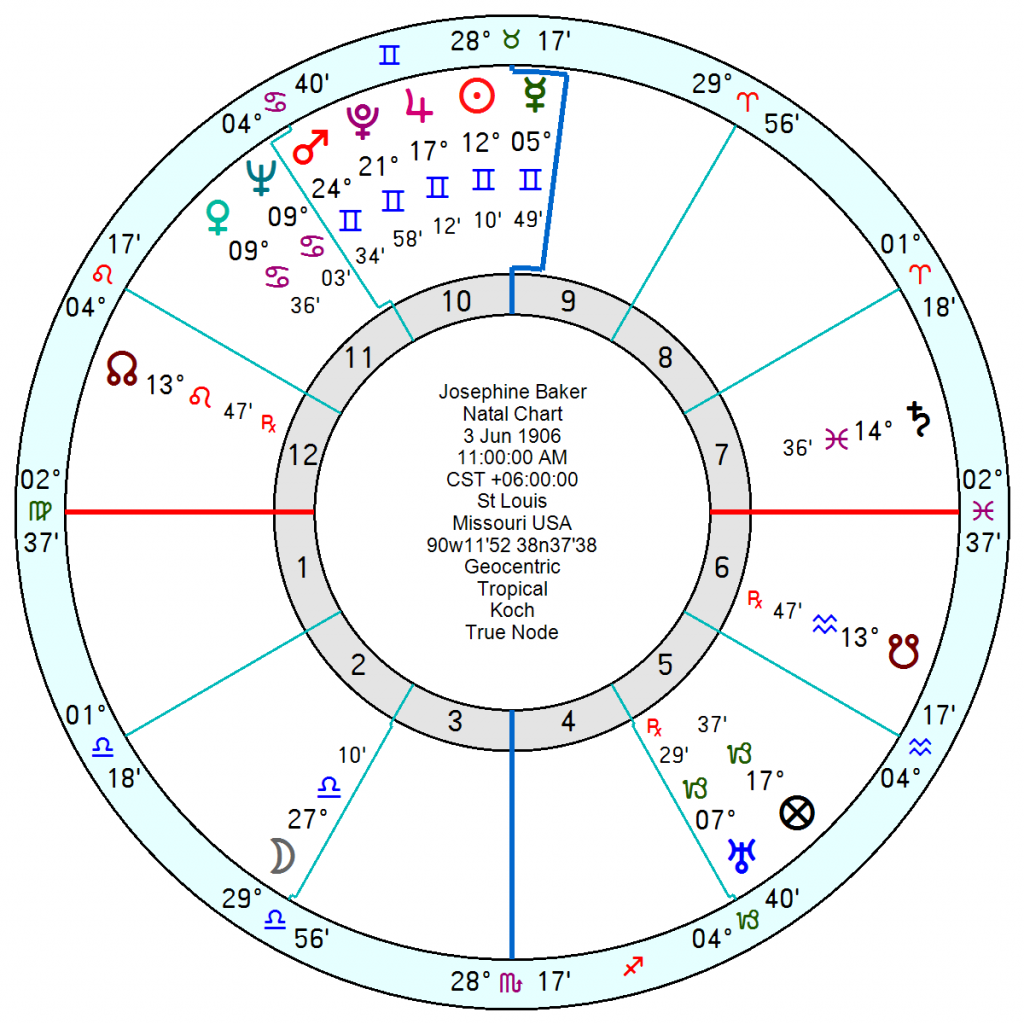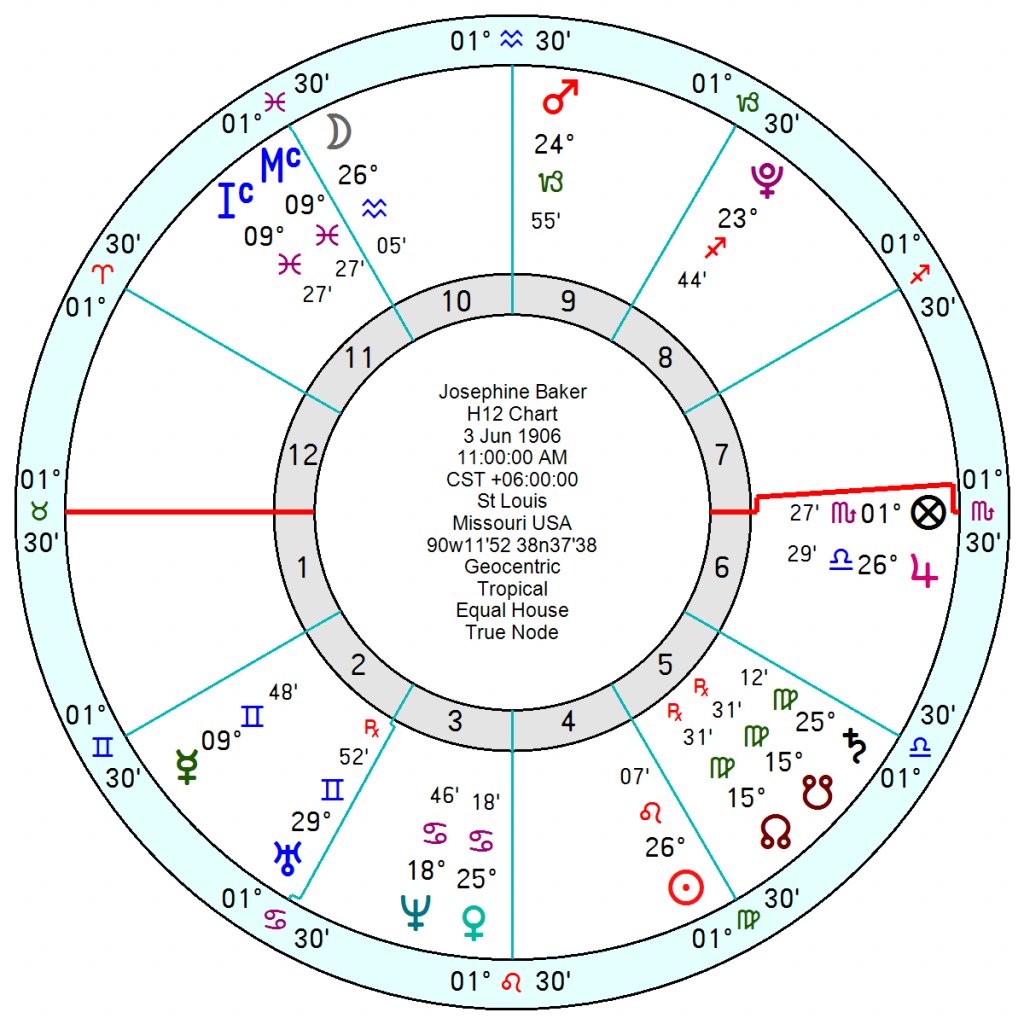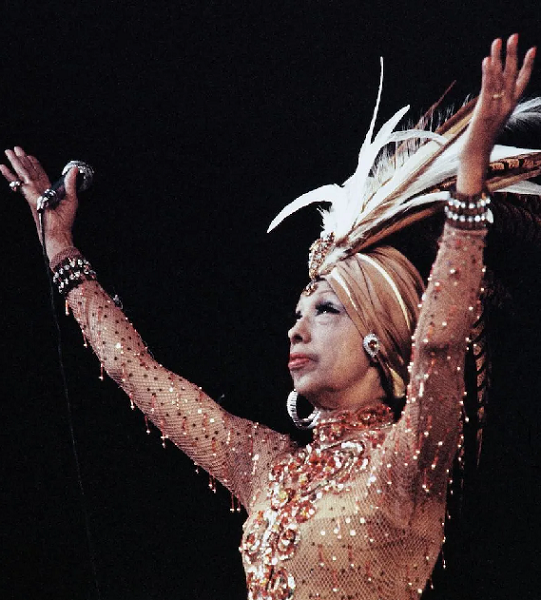


Josephine Baker, the American Folie Bergere dancer, who started life as a street kid in segregated Missouri and went on to become a World War II spy for France and resistance fighter; as well, later, as a civil rights activist in the USA, is being given an honoured spot in the Pantheon, a monument to national heroes. She is the first black woman to receive the honour and will lie alongside Jean-Jacques Rousseau, Victor Hugo and scientists Pierre and Marie Curie.
Born 3 June 1906 St Louis, Missouri, 11 am (biography?) she never knew her father, started work at 8 as a live-in domestic for white families where she was abused and eventually ran away to marry twice in her teens, at 13 and 15, before moving to Paris. There she became an icon of the city’s Jazz Age in the Roaring Twenties (Neptune in Leo), accentuating many African stereotypes of the colonial time in a banana skirt and little else. She became a French citizen after her marriage in 1937 to Jewish industrialist Jean Lion, who suffered from anti-Semitic laws; and at the outbreak of war offered her services to French counter-intelligence services and De Gaulle, working as an informant.
After the war, she became involved in USA anti-racist politics, fought against segregation during a 1951 performance tour of the US, causing her to be targeted by the FBI, labelled a communist and banned from her homeland for a decade. She spoke at the 1963 March on Washington where Dr Martin Luther King gave his famous “I have a dream” speech. Baker adopted 12 children from all over the world as part of a “Rainbow tribe”, living in a castle in the southwest of France.
What a life.
She had five planets in Gemini square Saturn in Pisces – her Sun, Mercury and upbeat Jupiter with her Jupiter conjunct a formidably courageous and attracted-to-danger Mars Pluto conjunction. The Saturn square would give her problems early on with low self-esteem and setbacks but would also instill a work ethic. She emerged from a brutal childhood to become her own woman.
She also had a creative and idealistic Venus Neptune in Cancer in the signature opposition to Uranus of the time. Significantly she also had a ‘leadership; North Node in Leo so was never destined to spend a life like her mother in poverty.
While I am not entirely convinced by the birth time since it doesn’t show France as a key location for her, it would put tr Pluto going through her 12th during WW11 which would make sense. And even without an accurate birth time, her Solar Arc Neptune Venus opposition Uranus were crossing her leadership Leo North Node in the hidden 12th then which would also fit.
Her creative 5th and especially her musical 7th Harmonic charts were well aspected. But it was her victim/healer 12th which is outstandingly strong, linking the Sun and Moon to a revolutionary Uranus Pluto and confident/lucky Jupiter.
The kind of person who should make all of us shut up and stop complaining about our tough lives and making excuses.

Josephine transcends black /white debates, although she struggled with bigotry & racism in her personal and professional life.
I don’t see her color when I see Josephine. It’s her great humanity that renders her heroic and that’s why she inspires me.
Carmel you wrote:
“Perhaps if she wasn’t mothered herself having left home at such a young age, she may have dreamt of creating the perfect family but not had the emotional wherewithal to folow it through.”
You are correct about this and one has to account for her relatively advanced age and diminished health and finances as she grew her Rainbow Family.
Josephine never let such things stop her until the day she died trying to make more money to support her family.
I don’t know anything about this lady except her name….but what a huge life!!!!! The chart is Something, no? Six air planets, and Mercury in Gemini as vocational indicator…..if the Virgo asc is correct that would be the chart ruler also. With this time the Sun sq Saturn would rule her 5th house, saying much about her childhood with that overwhelming sequential conjunction of 7 planets!!!!
I tried a 7 pm chart as she’d have the Moon in Scorpio instead of Libra which fits her early life and gives a Sag ascendant with Jupiter conjunct descendant suggesting the big, international life she made from talent and clearly total faith, because of her big Jupiter.
Strange.
Thank you very much Marjorie for responding to my comment so swiftly! Josephine Baker is an extraordinary woman, and managed to combine her many battles and challenges with a joyful, humorous playful quality. All that Gemini, plus Leo nodes? The Venus-Neptune in Cancer is glamorous, and also maybe signifies her idealistic rainbow tribe family of adopted children. Her own mother was an adopted child, by former slaves in the US.
Re the criticism of an “American born” black woman in the Pantheon – surely this isn’t so simple? Josephine fought against racism most of her life, and certainly encountered plenty of discrimination and limitations on her life when in the USA. She renounced her American citizenship and loved her adopted nation of France.
Amazing life and achievements, though I read that her children have strong feelings about her mothering. Perhaps if she wasn’t mothered herself having left home at such a young age, she may have dreamtof creating the perfect family but not had the emotional wherewithal to folow it through.
France Is Officially Color-Blind. Reality Isn’t.
In the aftermath of the French Revolution, the ancien régime in which lives were entirely circumscribed by economic capacity inherited at birth (peasants, landowners, aristocrats, clergy) was replaced with the universal category of citizen. France reinforced its commitment to its universal ideals after the Second World War, during which the Vichy regime had singled out Jews for deportation. And so today, unlike the United States, where the census tracks race, France does not formally keep statistics about race or religion, recognizing only two categories of people: citizens and immigrants.
But these ideals run up against the complexities of lived reality. France is one of the most multiethnic societies in the West, and just because it doesn’t formally recognize race doesn’t, naturally, mean that race, or racism, doesn’t exist. The upheavals over the killing of George Floyd have resonated in the country, generating public demonstrations against police brutality and debates about institutional racism and white privilege, about France’s history of slavery and colonialism, about whether statues of French historical figures complicit in slavery should be removed. In France, Black Lives Matter has broadened into a conversation about social and economic mobility, and access to housing, education, and jobs. Fewer than 1 percent of the CEOs of companies listed on the French stock exchange are of “non-European origin,” Le Monde recently reported.
In theory, access to the grandes écoles is based on an entrance exam for which anyone can apply. In practice, the test is so difficult that most aspiring students spend several years studying for it in special preparatory schools, many of which are private and costly by French standards. As a result, the majority of students who gain entrance come from a handful of the country’s best high schools and preparatory programs. Even the gatekeepers have gatekeepers.
The entrance exams themselves are not simply written affairs or multiple-choice tests, but involve oral exams in which a faculty jury asks prospective students to speak with fluency on a range of topics—more like the bar exam than the SAT. The mise-en-scène, or stagecraft, is designed “to produce deference, respect, social distance between the student and the institution,” and thus produces inequality, Annabelle Allouch, a sociology professor at the University of Picardie Jules Verne in Amiens and Sciences Po, and the author of a book on the exams, told me. “The grandes écoles are invested in this kind of magic thinking that they are superior.” Students from ethnic minorities in France have “internalized the fact that discourse about social class is legitimate and the discourse about race is illegitimate,” she added.
So how do you create an elite that reflects the country without knowing the country’s composition? How do you recognize, let alone compensate for the fact, that not all students have equal access to educational opportunities, while still adhering to the ideal that the state acknowledges individuals for their potential and merit, not their race or ethnicity?
Josephine Baker led an admirable life and had great cultural impact in France. I wonder however how that country could celebrate American black artists while simultaneously being a racist society at home and in its colonies. To this day, French-speaking African immigrants in Quebec tell us of their relief we are not France.
Her body will stay in Monaco, at the request of her family. French President Emmanuel Macron decided on her entry into the Pantheon, responding to a petition. In addition to honoring an exceptional figure in French history, the move is meant to send a message against racism and celebrate U.S.-French connections The coffin itself will be empty, inside however will be symbols associated with her
While Baker is widely appreciated in France, some critics of Macron question why he chose an American-born figure as the first Black woman in the Pantheon, instead of someone who rose up against racism and colonialism in France itself.